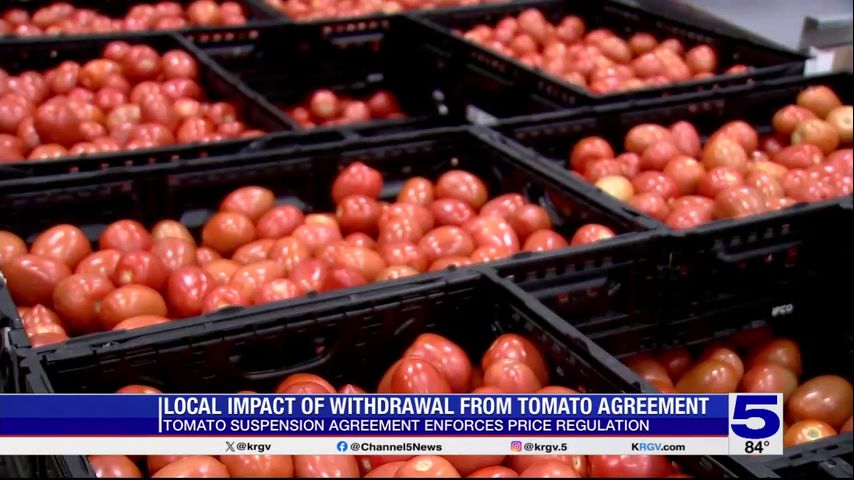Valley businesses could be impacted by withdrawal from tomato agreement
A Monday deadline could impact the price of tomatoes.
A 17 percent tariff on Mexican tomatoes is scheduled to take effect, but Rio Grande Valley lawmakers are asking President Donald Trump to intervene as it could impact companies locally.
GR Fresh has been operating for 60 years. They're a family owned business.
"We're growers and shippers from Mexico. We grow different Mexican commodities, mainly tomatoes," GR Fresh Vice President of Operations Luis Webb said. "We import them into the United States and distribute them. Here is our distribution center where we pretty much ship all over the country."
Earlier this year, the Department of Commerce announced it would withdraw from the tomato suspension agreement. That would be a 17 percent increase on tomatoes crossing the border starting Monday.
The agreement was put in place almost 30 years ago. Those in the industry, and lawmakers, say it creates a leveled playing field for those in the tomato industry.
Under the agreement, there is a set minimum price on tomatoes sold in the United States. This stops people from selling tomatoes below average costs, so there is healthy competition between companies.
However, according to the Department of Commerce, the agreement has failed to protect U.S. tomato growers from unfair pricing.
"It's not just going to protect a group of people, it's actually going have consequences in the long run," Webb said.
He says when the 17 percent tariff goes into effect, there will be an impact to the tomato industry and everyday shoppers.
"You're going to see it at your local grocery store, you're going to see a big increase in prices and availability," Webb said.
Webb says that price change would happen within two weeks of the trade agreement dissolving.
"That's going to cause either inflation or just people stopping buying tomatoes, and it's just going to effect the overall supply chain," Webb said.
Last year, over 2.1 billion pounds of tomatoes crossed through Texas. That includes 1.3 billion pounds of tomatoes in Pharr and 200 million pounds in Roma.
That's why a bipartisan group of lawmakers who represent the Valley got together on Friday.
State Representative Ryan Guillen, who represents Starr County, joined with U.S. Congressman Vicente Gonzalez to ask for this extension on the trade agreement.
"Most of this product passes through our region, so it produces jobs. We have warehouses, we have trucking, taxes are spent, money is spent here in the Rio Grande Valley," Gonzalez said.
"Maintaining this agreement is especially important to Texas, where they depend on cross border trade and economic activity that it brings," Guillen said.
Congresswoman Monica De La Cruz also released a statement on the tomato agreement.
"Negotiations are ongoing. My top priority will always be to deliver solutions for Texas farmers, especially securing the water we are owed by the Government of Mexico."





